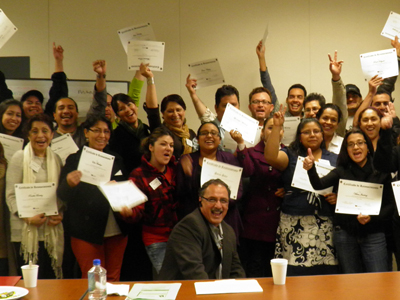
Escaping the vicious cycle of family violence ---
Teresa Rubio, 38, a resident of Richmond never thought that a peaceful life without shouts and threats from her husband could be possible. Nor did she imagine that one day she would be helping, supporting, and coaching other women who were abused by their partners.
Rubio was married for 25 years and has three sons from her marriage. “I met my former husband when I was fourteen,” Rubio said. “He was much older than me and I had my first kid when I was sixteen.”
From the beginning Rubio suffered abuse from her husband. “He used to push me, call me names, take money away from me, shout at me, and never allowed me to work,” Rubio remembers. “I did not have support from my family - I did not have a good communication with them and I did not know where to go for help.”
According to the California Women‘s Health Survey (CWHS), approximately 40% of California women experience physical intimate partner violence (IPV) in their lifetimes. Also, almost one out of four Latinas will experience IPV sometime in their live (Tjaden & Thoennes, 2000).
A new coalition called La Red Latina was formed last year with the support of more than thirty non-profit organizations in the East Bay. Its mission is to tackle and eradicate domestic violence among Latinos in the East Bay.
“La Red Latina is a coalition of non-profit organizations that was created to work together against family violence,” said Claudia Arroyo, spokesperson for La Red Latina. “As a coalition we want to share resources to better serve the community.”
The coalition was created in response to the challenges of fewer community resources and an increase in the Latino population in East Bay.
La Red Latina will host its first conference at Laney College in Oakland on October 8th. The conference will have ten different workshops and activities for women, men, youth, children and the LGBT community.
“We want people to get information about how to prevent family violence,” said Maricela Rosas, who works for La Clinica in Oakland, which is part of the coalition. “We want also to teach kids that the violence is not positive, people should realize that what we learned when kids influences our behavior in the future.”
At the conference people will learn about what defines a healthy relationship, different forms of violence, how violence affects kids, self-defense techniques, and communication skills. Also, there will be workshops for youth to teach them healthy dating practices and the dynamics of teen dating violence. Legal assistance will be provided by experts among many other activities.
“There are resources out there to help women to get out of a cycle of violence,” says Rosas. “The first step is to accept that we are in an abusive relationship.”
A few years into her marriage, Rubio realized that she was in an abusive relationship but it took her twenty-five years to find the courage to get divorced from her husband.
“I remember that I was so afraid and depressed,” Rubio said. “Then I saw a commercial for Latina Center here in Richmond and I decided to attend to one of their workshops.”
“After a few workshops I realized that it was not my fault,” she says. “We both were responsible for what had happened. In our culture we believe what people say to us and then we do not take action. The truth is that if we look out there for information from experts we can get out of the vicious cycle of violence.”
The conference will take place on October 8th, 2011 at Laney College, located at 900 Fallon St., Oakland from 9 a.m. to 5:30 p.m. For more information call 510-535-6421, email to carroyo@laclinica.org or go to www.laredlatina.org.
